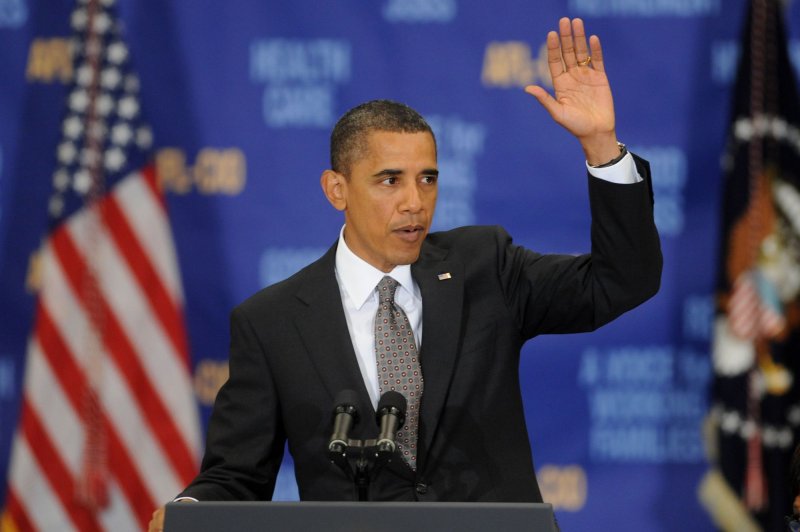U.S. President Barack Obama waves after speaking at the AFL-CIO Executive Council Meeting at the Washington Convention Center in Washington on August 4, 2010. President Obama outlined efforts by his administration to steer the nation out of an economic downturn and further action required to recover the 8 million jobs lost during the current recession. UPI/Michael Reynolds/Pool |
License Photo
COLLEGE PARK, Md., Aug. 10 (UPI) -- Analysts expect the U.S. Commerce Department to report Wednesday that the deficit on international trade in goods and services was $41.5 billion in June or 3.4 percent of gross domestic product.
The trade deficit is a huge drag on U.S. economic recovery and jobs creation.
In the second quarter overall, imports grew so much more rapidly than exports that the growing trade gap subtracted 2.8 percent from growth.
But for the increase in the trade gap, GDP would have grown 5.2 percent instead of 2.4 percent. At that pace, unemployment would fall by 2013 to less than 5 percent, the level accomplished the two years prior to the Great Recession.
U.S. President Barack Obama is seeking to double exports through marketing programs and new free trade deals. However worthy those initiatives may be, doubling exports does no good if imports double, too. By increasing the trade gap, more open trade policies would increase the drag on growth and jobs creation.
That isn't an attack on free trade but rather on trade policies that permit a huge trade imbalance.
In the modern theory of comparative advantage taught in graduate schools of economics, the gains from free trade are premised on approximately balanced trade. Countries increase foreign purchases in industries where they are relatively less productive and specialize in what they do best. The United States is doing too much buying but not enough selling.
Oil and consumer goods from China account for nearly the entire trade deficit and without a dramatic change in energy and trade policies, the U.S. economy faces unemployment around 10 percent indefinitely.
Obama's efforts to halt offshore drilling and otherwise curtail conventional energy supplies -- premised on false assumptions about the immediate potential of electric cars and alternative energy sources -- threaten to make the United States even more dependent on imported oil.
Detroit can build many more attractive and efficient gasoline-powered vehicles now and national policy to accelerate the replacement of the existing fleet would reduce imports, spur growth and create jobs.
To keep Chinese products artificially inexpensive on U.S. store shelves and discourage U.S. exports into China, Beijing undervalues the yuan by 40 percent. It accomplishes this by printing yuan and selling those for dollars to augment the private supply of yuan and private demand for dollars. In 2009, those purchases were about $450 billion or 10 percent of China's GDP, and about 35 percent of its exports of goods and services.
In 2010, the trade deficit with China reduces U.S. GDP by more than $400 billion, nearly 3 percent. Unemployment would be falling and the U.S. economy recovering more rapidly but for the trade imbalance with China and Beijing's protectionist policies.
In June, China indicated it would adopt a more flexible exchange rate policy but it has made clear Americans shouldn't expect a dramatic change in the value of the yuan.
China recognizes Obama isn't likely to counter Chinese mercantilism with strong, effective actions; hence, it offers token gestures and cultivates political support among U.S. businesses like General Motors profiting from investments in China.
Obama should impose a tax on dollar-yuan conversions in an amount equal to China's currency market intervention divided by its exports -- in 2009 that was about 35 percent. For imports, at least, that would offset Chinese subsidies that harm U.S. businesses and workers.
--
(Peter Morici is a professor at the Smith School of Business, University of Maryland School, and former chief economist at the U.S. International Trade Commission.)
--
(United Press International's "Outside View" commentaries are written by outside contributors who specialize in a variety of important issues. The views expressed do not necessarily reflect those of United Press International. In the interests of creating an open forum, original submissions are invited.)















